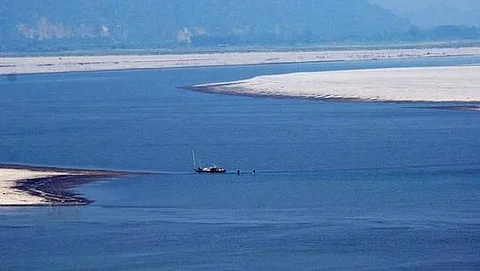
- Home
- Live Blog
- Breaking News
- Top Headlines
- Cities
- NE News
- Sentinel Media
- Sports
- Education
- Jobs

Harsha Mohan Sarma
(harshasarma183@gmail.com)
“A drop of water, if it could write out its own history, would explain the universe to us.”
These words by the famous American poet, author, and educator Lucy Larcom remind us of the profound story a mere drop of water could tell. In Assamese, there’s a saying: “Water is life.” Indeed, water is the foundation of our existence. Without it, human life cannot be sustained. We might survive for a week without food, but without water, survival beyond three or four days is highly unlikely. Despite our bodies being composed of about 70% water, we still need a continuous external supply of drinking water. Water is the basic element for all living beings and plants. Earth became a habitable planet only because of water.
Although two-thirds of the earth’s surface is covered with water, today, humans are facing a severe water crisis. Water is a nonrenewable resource. It may appear abundant, but the reality is different—clean, drinkable water is becoming scarce. Many of the essential elements our body requires are obtained from water. The lack of pure drinking water is now adversely affecting our health. Therefore, drinking purified water is crucial for maintaining good health. Water is a transparent, fluid substance essential in our daily lives. From washing our face in the morning to cooking and maintaining hygiene—nothing is possible without water. Our agricultural sector is entirely dependent on it. Seasonal farming is governed by water availability. Even industries and factories rely heavily on water for operation. Beyond human usage, aquatic life—ranging from tiny plankton and insects to massive whales—cannot survive without water. All life forms, flora and fauna, are fully dependent on water. We must use it in harmony with nature. Water is necessary to keep us happy and healthy. We are aware of the suffering in water-scarce countries like those in Africa, where lack of water makes life unbearable. The hardships endured there are hard to imagine unless experienced firsthand. Observing these conditions, the people of India should recognise the value of water and take steps to conserve it. Without water, humanity cannot survive for long.
In India too, there is a shortage of clean drinking water. Only about 3% of the water in our underground reserves is suitable for drinking. The rest is either saline, arsenic-contaminated, or contains excessive iron. By the year 2050, India’s population is projected to reach around 1.6 billion, making it the most populous country in the world. At that point, the drinking water crisis may become even more catastrophic. Therefore, we must act now—by using water judiciously, developing new methods of conservation, and raising awareness. Along with government efforts, ordinary citizens must also act responsibly. If water vanishes, Earth’s green environment will be destroyed. Plants will wither away, and the planet will turn into a barren wasteland. Without trees, seasonal variations will disappear, and the earth will gradually transform into a burning mass. If we fail to conserve water, aquatic plants and animals will be wiped out, and humans will be deprived of protein-rich food. Water is a symbol of civilisation and a source of power. Electricity, which is vital for modern living, can largely be generated from water. With machines playing a huge role in our lives today, electricity has made once-difficult tasks easier. But to operate these machines, we need electricity, which mostly comes from water sources.
However, the large dams constructed in the name of power generation often bring devastating threats to our lives and livelihoods. These dams release excess water, causing floods in low-lying areas, damaging crops and property, and taking lives. In contrast, during dry spells, rivers dry up into sandy beds, disrupting the lives of fishermen who depend on rivers for their livelihood.
Water quenches our thirst. It also refreshes us and helps us function. It’s essential for keeping our skin smooth and maintaining body hydration. To compensate for the water lost through bodily processes, drinking three to four litres of pure water daily is necessary. Water rejuvenates both body and mind. There are many sources of water on Earth—surface water, rainwater, groundwater, lake water, river water, seawater, melted snow, etc. However, not all these sources provide drinkable water. Saline seawater, though essential for marine life, is unsuitable for human consumption. Scientists and researchers have been working for years to find ways to make seawater drinkable. If this becomes a reality, the global drinking water shortage could be significantly reduced. Still, people must also show responsibility in water use—avoiding waste and acting like responsible citizens.
Sometimes people even speculate that, in the near future, the world may witness a war over water. Tensions over water already exist at national and international levels. There are long-standing disputes over river waters: between India and Pakistan over the Indus, between Turkey, Syria, and Iraq over the Euphrates and Tigris, and even within India, between Tamil Nadu and Karnataka over the Cauvery. If international organizations do not step in to resolve these issues soon, a global war over water could become a reality. Before such a destructive conflict occurs, all nations must adopt a spirit of cooperation and work toward solutions. Water politics must end. It must be used for the benefit of all humanity. Let us always remember: the truly wealthy person in the future will be the one who holds water in their hands. As Benjamin Franklin aptly said, “When the well’s dry, we know the worth of water.”